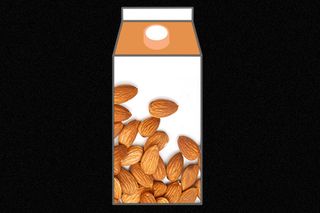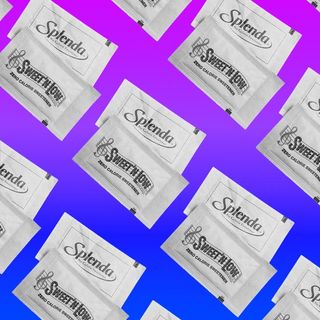
Untrending: There Are a Lot of Reasons to Never Drink Almond Milk
One serving of almond milk doesn’t actually contain a lot of almonds.

In Untrending, we side-eye the latest fads so we know what we’re getting ourselves into — and what (if anything) we’re getting out of them.
Almond milk — not delicious badam milk, but rather a concoction of pulverized almonds and water — has been a growing fad in the West for a few years, and is now sneakily making it onto menus at trendy and ‘health-conscious’ restaurants in India. Domestic brands like RAW Pressery and Second Nature already offer cartons of it. If we’re reading the tea leaves right — India is already one of the world’s top four almond importers — almond milk is going to be everywhere within the next year.
“Today, a health-conscious Indian chooses an option with non-dairy/plant- based milk products like almond milk, soy milk, coconut milk etc because of its known benefits like zero cholesterol, low calories and high protein depending on the requirement,” Rohit Bhagat, business head of
Drums Food International, the makers of Epigamia, told Financial Express in a report on the changing dairy industry.
The question is: should that health-conscious Indian buy into this fad? The answer: No; the health benefits of almond milk have been vastly overstated. So, unless you’re lactose intolerant, consider sending that watered-down nut pulp back to whence it came. Or at least sip it with a shrug.
Related on The Swaddle:
The Myth of Healthy Ghar ka Khana
First, the pros: Almonds, ostensibly the main ingredient in almond milk, have a number of health benefits. For the amount of calories they contain, they carry a big nutrient punch, full of fiber, protein, healthy fats, vitamin E, manganese, magnesium, as well as antioxidants.
However, almond milk is not as healthy as almonds. The recipe, which an industry insider told Business Insider is more or less the same “across the board,” is typically only 2% almonds — which means while “a serving of almonds has 14 grams of total fat and 6 grams of protein, a serving of the milk has 2.5 grams of fat and just one gram of protein.” This loss of protein and good fats actually compromises a lot of the weight loss- and blood pressure-related benefits studies have associated with eating almonds.
While almond milk typically contains more potassium as well as more vitamins A and D, it’s because the dilution of Prunus dulcis embryos is fortified — just like most store-bought cow’s milk — not because it’s inherently healthy.
Almond milk has been criticized, too, for its sugar content. India seems to have learned from the West on this one; the nutrition labels for the six brands I checked (a very scientific examination) contained no added sugar — unless they were flavored; anything with vanilla or chocolate had roughly 20% of your daily recommended sugar intake in a single serving.
So, almond milk isn’t the nutritional panacea marketers have sold us. Most food isn’t — is there any other reason we should side-eye this fad for
liquified tree ovum?
As it happens, yes. Almond production is terrible for the environment. While milk production does carry a far more serious carbon footprint, there are other ways to be unsustainable: “It takes a bonkers 1,611 US gallons (6,098 liters) to produce 1 liter of almond milk,” Pete Hemingway, of the UK’s Sustainable Restaurant Association, told The Guardian last year.
(By contrast, it only takes 100 liters of water to yield 100ml of cow’s milk.)
And almonds are produced in a place that can ill-afford to expend water willy-nilly: More than 80% of the world’s almond production occurs in the US state of California — which is about 10 years into a drought. This has caused almond farmers to drill deep into groundwater reserves, draining aquifers, and causing some areas to cave by up to 11 inches a year — threatening the stability of nearby infrastructure. The growing, global demand for almond milk is making a bad environmental problem worse.
All of this isn’t to say don’t drink almond milk. For the up to 75% of Indians who are lactose intolerant, almond milk could be a welcome and needed alternative to cow’s milk. But granulated kernel gruel shouldn’t be seen as the must-drink ticket to great health — any more than any other kind of milk. Because, as the Business Insider report concludes: “If almond milk closely resembles any beverage, it’s a glass of water and a multivitamin.”
Liesl Goecker is The Swaddle's managing editor.
Related


We’ve All Been Sold a Lie About Non‑Sugar Sweeteners
